Report on the role of computer games in surviving self-isolation. Part 1/2
- May 7, 2020
- Dawid Zalewski
In our previous report we focused on how the severe economic consequences of the systemic response to the SARS-CoV-2 epidemic have affected the computer games market. This time, we will look at the data provided by the players themselves to draw conclusions on the behavioral effects of self-isolation. What has changed in their behavior since they started spending their days at home? Have they played more in recent weeks? What games do they play most often? The responses provided by this specific social group offer valuable insights into the impact of interactive entertainment on people.
The well-being of players in self-isolation
Over the past weeks, we’ve all had the opportunity to get used to the extraordinary pandemic situation.
Currently, over 2.5 billion people are bound to their homes. Ninety countries have introduced various restrictions on mobility and the functioning of schools, colleges and companies.
However, not everything can be controlled from above. Campaigns like #stayhome have made it clear that self-isolation is, first and foremost, civic responsibility.
A general recommendation in the time of pandemic is to, as much as possible, voluntarily avoid direct contact with other people. This means choosing the sofa over a park bench and engaging in niche interests at the expense of partying with friends, as well as consuming culture online rather than in cinemas, museums and concert halls. Can it be that the world started glorifying the lifestyle of a stereotypical video game enthusiast?
Video game companies also quickly realized that it was their time to shine. They are falling over themselves trying to make the period of self-isolation nicer to the players and, in the process, to raise a new generation of fans for some the iconic game series – Sony, as part of the #PlayAtHome initiative, is giving away games for free. Do such campaigns really encourage better compliance with the self-isolation recommendations?
We asked 870 players (773 men and 97 women) to share their experiences to determine if gaming helps them through social isolation.
As many as 41% of the surveyed players stated that their overall well-being had deteriorated since the start of the #stayathome order,
44% did not notice any changes, whereas only 15% claim their condition has improved in the circumstances.
This shows that interest in video games does not go hand in hand with innate resistance to loneliness. Even players can’t not do without regular social contacts.

What and how often do we play during the epidemic?
Although we are literally surrounded with the news about the virus, the popularity of the term “coronavirus” in Google Trends is actually decreasing. This is reflected by the responses – 81% of players surveyed by us disagree with the statement that their interest in pandemic-themed games has increased. How do their consumer choices relate to these declarations?
What games do we choose while confined to the four walls?
The responses indicate that the impact of isolation on the genre preferences is negligible. RPG, FPS and Action / Adventure still top the rankings of most popular game genres. However, contrary to the above-mentioned declarations of the participants, the ranking of the settings they choose seems impacted.
Despite the declared lack of interest in pandemic – or bio-threat themed games, such titles have recently been chosen more often than in the period preceding the isolation and #stayathome initiative.
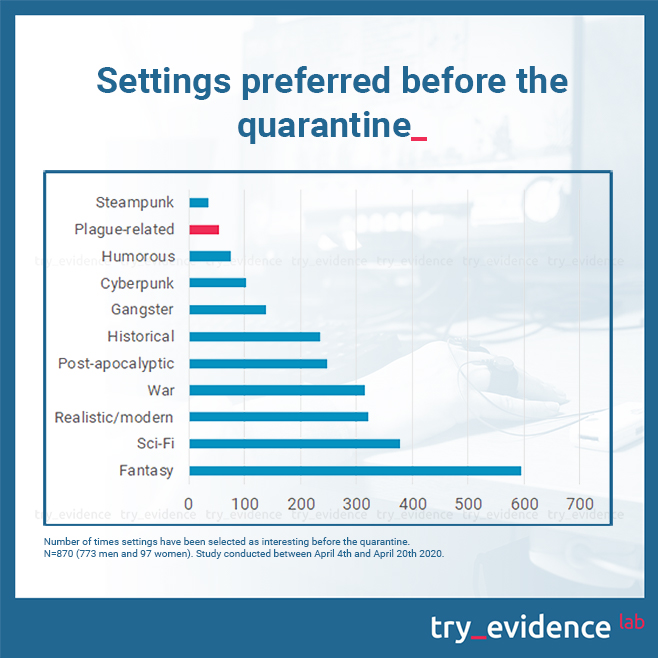
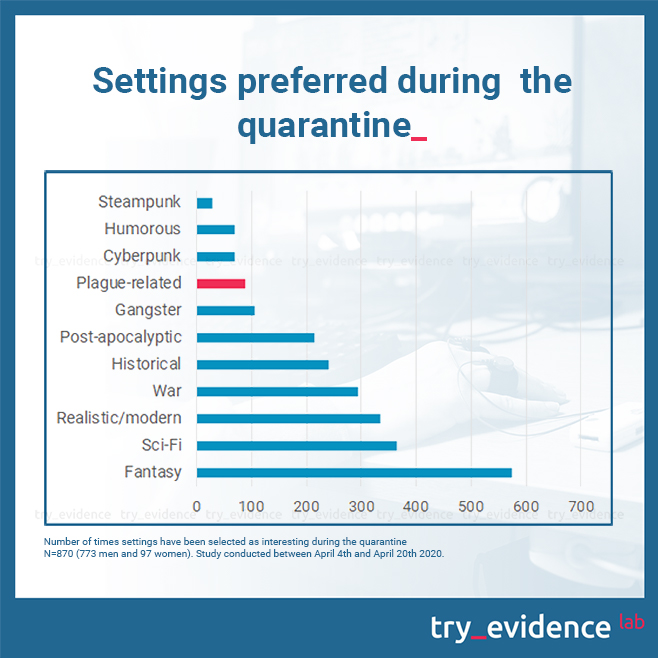
It could naturally be concluded that, given the restrictions on social contacts, multiplayer games should be the most popular. Such games allow people to interact with other people online, so they could serve as a substitute for a part of the social needs of players (we suggested this in our previous report on the sales of games).
However, such a virtual alternative to meeting friends may simply be insufficient.
Every second player admitted that they lacked social interaction, but only 30% of the respondents said that multiplayer games met this need.
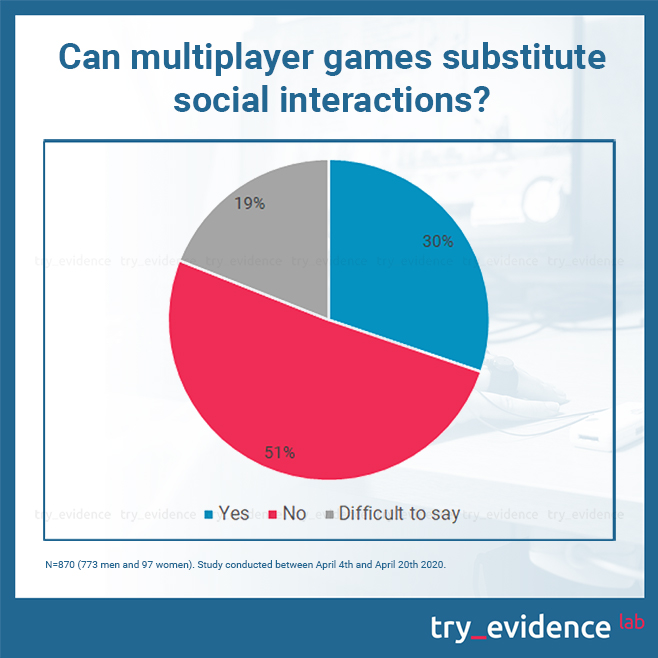
Do we play more than before the pandemic?
According to our respondents’ answers – yes. The number of people playing every day has increased from 42% to 63%.
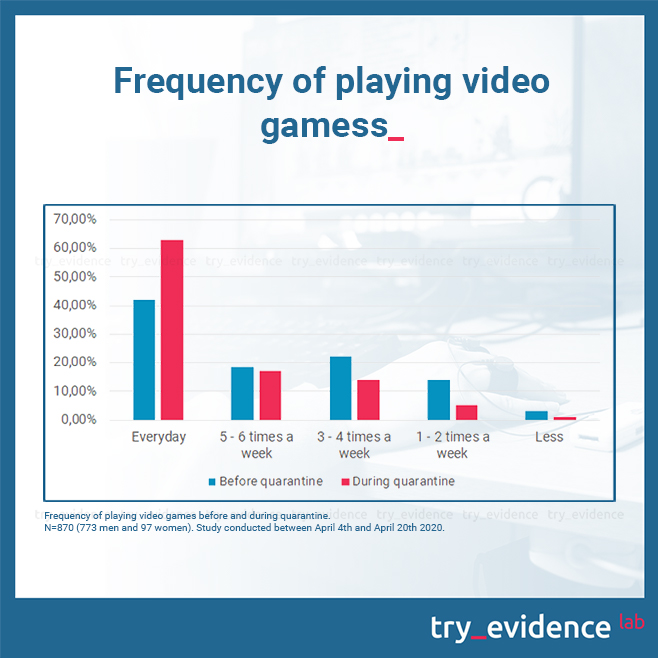
People not only play more often, but also spend more hours playing video games each day. There are now twice as many players spending 4-8 hours a day in the game. We also noted a spectacular increase in the number of people playing “full time” – 9.54% of respondents play at least 8 hours a day, compared to 2.53% before.
Interestingly, not much has changed in the mobile gaming sector – the number of people spending 1-2 hours a day playing mobile games increased from 20% to just over 25%.
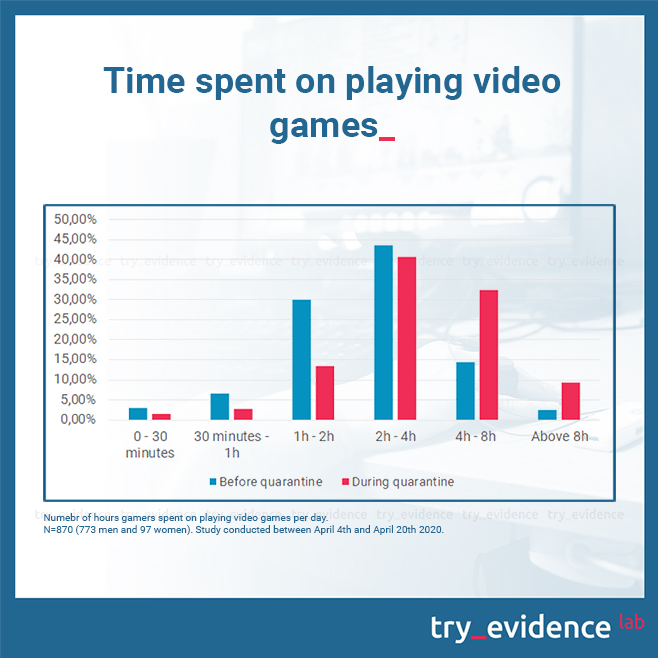
What could be the reason for such statistics?
The most obvious reason why people play longer and more often during the pandemic is more free time. Only 14.37% of the surveyed players continue working as usual. More free time is just one possible explanation, because psychological factors may also be at play here.
Stress influences people’s tendency to indulge in entertainment, and the atmosphere of uncertainty is an integral part of the situation. Students are worried about their final exams, entrepreneurs are concerned about their business continuity, and as shown by our study, as many as 19% of players have a prospect of losing their jobs due to the epidemic. In addition, according to medical professor Justyna Kowalska, the stress experienced during quarantine can also be affected by sheer boredom and frustration.
Meanwhile, for almost half of those surveyed, computer games are a way to deal with stress.
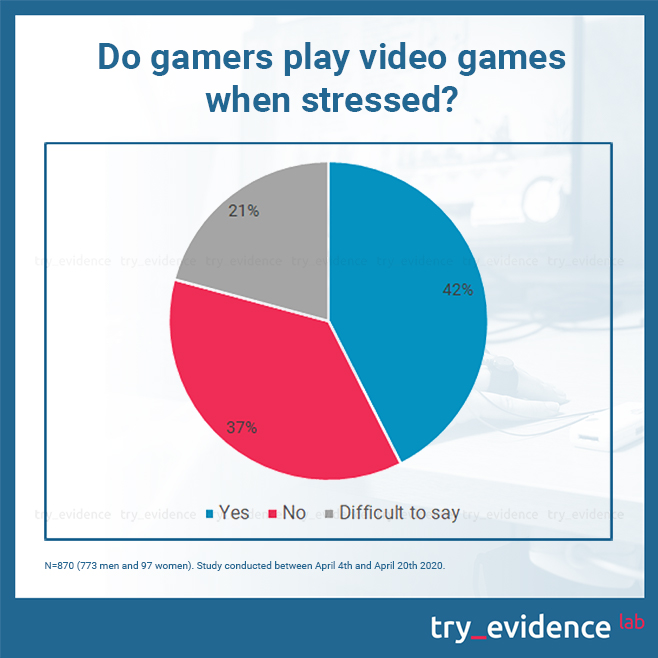
Summary – what do we win by playing during the epidemic?
Escape from stress and loneliness
Video games may, to some extent, support our psychological wellbeing during the COVID-19 pandemic. Some players, through online games, meet their social interaction needs – as confirmed by 30% of our respondents. What’s more, video games are entertainment that helps you manage your excess free time, and thus avoid boredom and frustration caused by mobility restrictions.
Accessibility of interactive entertainment
Games make social distancing and staying at home much easier. Games are currently available to the general public. Game developers share their products for free in the spirit of corporate social responsibility, which helps to find interesting occupation for those players who are in desperate need of fresh content. New titles are readily available – there is even no need to leave home, and digital distribution surpassed physical sales long before the #StayAtHome campaign.
Our research shows that during the epidemic people play more often and for longer periods of time – and tend to prefer games dealing with plague and bio-threats. However, the relatively low interest in multiplayer games is surprising, especially in the light of the spectacular sales increases shown in our previous report.
All this allows us to conclude that video games are not only one of the most engaging, but also safest pastimes for the time of pandemic. In virtual reality, everyone can find a way to meet their needs.
More from Try Evidence!
In addition to players’ declarations, we are also interested in their real behavior, which is why we analyze them from different perspectives. What game genres are gaining real popularity? Which game genres attract more players? Which game genres keep people playing the longest?
Answers to these and other questions can be found in the next part of our report, in which we analyzed the data provided by SteamSpy on player behavior during the pandemic.







